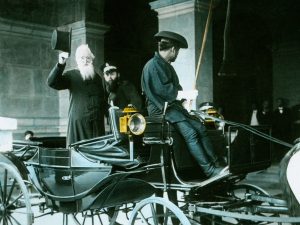By Douglas S. Bursch–
We are called to be peacemakers. However, if our actions are not thoughtful and intentional, we wound those entrusted to our care. We harm friends, family, neighbors, strangers and the people we come across in our online living. To bring peace, we must become intentional peacemakers. The nature of social media and the already persistent destructive habits of many users requires we develop intentional reconciling strategies. If we don’t have a clear understanding of what we are trying to accomplish online, we succumb to our worst inclinations. We fight the wrong battles for the wrong reasons. We produce divisions, conflicts and heartaches. We might win our arguments, but we lose our ability to advance the good news of Jesus Christ.
Paul wrote, All this is from God, who reconciled us to himself through Christ and gave us the ministry of reconciliation (2 Cor. 5:18). God gave us the ministry of reconciliation. Are we truly walking out this ministry online? Do we have an intentional social media peacemaking plan? How do we assess the success or failure of our online reconciliation efforts? Do we have Christ-centered, fundamental reasons motivating our social media communication? If you do not have some measure of clarity concerning these questions, then I urge you to join me in developing a simple, intentional peacemaking plan, strategy, framework or rubric through which you assess all of your online communication.
This online strategy is not a set of laws you use to condemn yourself and others, but rather the development of central principles, guidelines or questions you ask yourself to motivate your social media activity and to assess whether or not you make room for the reconciling presence of Jesus Christ. This intentional assessment allows us to have deeper conversations with God about why we exist online and about the importance of our words, actions and attitudes in the advancement of God’s kingdom. I’m going to share five questions I try to keep in mind during every online interaction. I pray these principle-based questions benefit you in your online practices as you form your own social media peacemaking plan.
1. Is reconciliation my motivation? When reconciliation becomes the “why” behind our social media communication, the advancement of Christ’s kingdom becomes the fruit of our online activity.
2. Are people my priority? When we focus on people versus ideas and political agendas, we seek God’s presence in the conversation. For us to be peacemakers we must intentionally humanize every online interaction.
3. Am I communicating truth in love? In a polarized, divisive age, we must intentionally examine the motivation of our hearts when communicating truth. If we lose sight of love, we lose sight of our purpose for communicating.
4. Where is the grace? Even when confronting polarizing behaviors or moderating online groups, let us advance God’s purposes through the reconciling grace of Christ. The gospel thrives in climates of grace.
5. What is the spirit saying? Too often the immediacy of social media keeps us from pausing to consider the perspective of our reconciling Savior. How many conflicts could be handled better if we first took time to find the heart of God before we post, tweet or hit send?
When I look back on my life, I realize I’ve done a lot of damage focusing more on giving answers than asking questions. I think about all the answers I had as a college freshman as I argued with a fellow classmate to the point of tears. In my zeal to win the debate, I provided all the right answers, but didn’t stop to ask myself the most important questions.
If I had asked myself the right questions about my true motivations, I would have focused more on pointing to Jesus and less on trying to be right. I would have cared about the person in front of me and the God who loved her more than I cared about my clever debate tactics. I would have realized my truth was being communicated without the love of Christ. If I had paused to question my intentions, I would have noticed how my argumentation left no room for grace or mercy. Most importantly, if I had sought God’s heart in the matter, I would have made room for the Spirit’s leading and facilitated an environment that turned our debate into an opportunity for a fellow student to express her heart instead of defending her worth.
Unfortunately, I was too full of answers to waste my time with the right questions. I’ve provided questions I use to assess my social media interactions. These questions flow from my struggle to embrace the ministry of reconciliation in my online communication. I believe many of the questions and issues I addressed are universally applicable to every social media user. Even so, I recognize each of us must come to our authentic heartfelt conclusions concerning the effectiveness and appropriateness of our own online interactions.
We do not live our lives in comparison to others. Each person must find the heart of God for their own journey. Christ proclaims, “You must follow me” (John 21:22). Consequently, I urge you to prayerfully seek God’s heart on which questions you must ask yourself as you engage in the ministry of reconciliation. I am confident God will give you a peacemaking plan specific to your unique personhood and calling.
Peacemaking is difficult. We can’t just say and do whatever comes to our minds. The ministry of reconciliation requires we actually wait upon God, submit our wills to God and learn how to temper some of our less productive inclinations. Social media peacemaking turns our online world into something far more than just a place for self-expression. Instead, our online lives become ministry fields, environments where we daily walk with Jesus into interactions and conflicts to practice the ministry of reconciliation. Our communication is not our own but hidden in Christ. For peacemakers, every online interaction presents us with the opportunity to make room for the reconciling presence of God. Whether individuals accept or reject our peacemaking mission, we find great meaning in living as online ambassadors of God’s reconciling kingdom.
Adapted from “Posting Peace: Why Social Media Divides Us and What We Can Do about It” by Douglas S. Bursch. Copyright (c) 2021 by Douglas S. Bursch. Published by InterVarsity Press, Downers Grove, IL. www.ivpress.com
Do Good:
-
- Read “Posting Peace: Why Social Media Divides Us and What We Can Do about It” (IVP, 2021) by Douglas S. Bursch.
- You’ve probably seen the red kettles and thrift stores, and while we’re rightfully well known for both…The Salvation Army is so much more than red kettles and thrift stores. So who are we? What do we do? Where? Right this way for Salvation Army 101.
- Are you best suited to join the Fight for Good in disaster relief? Mental health? Social justice? Take our What’s Your Cause quiz and discover where you can make the biggest impact today.













